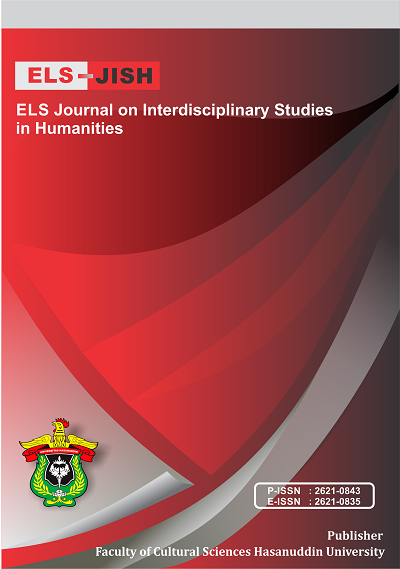Syllabus Design for PKN-STAN Entrance Test: A Need Analysis
DOI:
https://doi.org/10.34050/elsjish.v6i3.27836Keywords:
Need Analysis, Prospective Students, Preparation ProgramAbstract
The aim of this study is to scrutinize the needs of the prospective students of Politeknik Keuangan Negara – Sekolah Tinggi Akuntansi Negara (PKN-STAN) as well as to design syllabus for preparation program of PKN-STAN entrance test. This research was a descriptive research in which questionnaires were distributed to prospective students and on-going students of PKN- STAN while interviews were administered to graduates of PKN-STAN, English teachers of senior high school and English lecture. To obtain more accurate information on prospective students’ needs. The data were analysed in quantitative and qualitative method. The findings of this study revealed the needs for setting up the syllabus for preparation program of PKN-STAN entrance test. The proposed syllabus provided a set of topics/ materials on structure and written expressions and reading comprehension. The syllabus was implemented to prototype course materials completed with exercises. The syllabus was an integration of aims, objectives, and activities to bridge the gap on the prospective students’ present knowledge and the required knowledge for PKN-STAN entrance test..
References
Afrina, R., & Ardi, H. (2021). Students' Strategy In consecutive Interpreting a Short Motivation Speech into Bahasa Indonesia. Journal of English Language Teaching, 10(1), 80-95.
Brown, J.D. (1995). The Element of Language Curriculum: A Systematic Approach to Program Development. Heinle&Heinle Publisher: Boston.
Cohen, L., Manion, L., & Marrison, K. (2007). Research Method in Education: Sixth Edition. Roudledge: New York.
Dick, L. (2005). Syllabus writing. Retrieved September 14, 2013, from http://www.teachingenglish.org.uk/articles/syllabus-writing
Dina, M., & Sparingga, M. F. (2022). A Discourse Analysis on Students Skill in Interpreting English Sentences into Indonesian in English Interpretation Class During Covid-19 Pandemics. Lire Journal (Journal of Linguistics and Literature), 6(2), 126-138.
Hutchinson., T., and Waters, A. (1987). English for Specific Purposes: A Learning-Center Approach. Cambridge University Press: Cambridge.
Krashen, S. (2009). Anything but reading. Knowledge Quest, 37(5), 18.
Latief, M. R. A., Saleh, N. J., & Pammu, A. (2020). The effectiveness of machine translation to improve the system of translating language on cultural context. In IOP Conference Series: Earth and Environmental Science (Vol. 575, No. 1, p. 012178). IOP Publishing.
Lodico, M. G., Spaulding, D. T., & Voegtle, K. H. (2010). Methods in educational research: From theory to practice. John Wiley & Sons.
Malau, P. P., Lubis, S., & Mono, U. (2021). Errors in Consecutive Interpreting: A Case of Jessica Kumalawongso’s Court. Language Literacy: Journal of Linguistics, Literature and Language Teaching, 5(1), 71-79
Notion, I.S.P., & Macalister, J. (2010). Language Curriculum Design. Roudledge: New York.
Quoc, N. L. (2022). Factors Affecting Consecutive Interpretation: An Investigation From L2 Learners’ Perspectives. Journal of Positive School Psychology, 6(10), 791-812.
Rahman, F. (2018). The Constraints of Foreign Learners in Reading English Literary Works: A Case Study at Hasanuddin University. Journal of Arts and Humanities, 7(2), 01-12.
Richards, J.C. (2001). Curriculum Development in Language Teaching. Cambridge University Press: United Kingdom
Riduan & Achmad. (2011). Cara Menggunakan dan Memaknai Path Analysis. Alfabeta: Bandung.
Yassi & Kaharuddin (2018). Syllabus Design for English Language Teaching. Pranadamedia Group. Jakarta.
Downloads
Published
How to Cite
Issue
Section
License
Copyright (c) 2023 muhammad hasan basri

This work is licensed under a Creative Commons Attribution-ShareAlike 4.0 International License.






